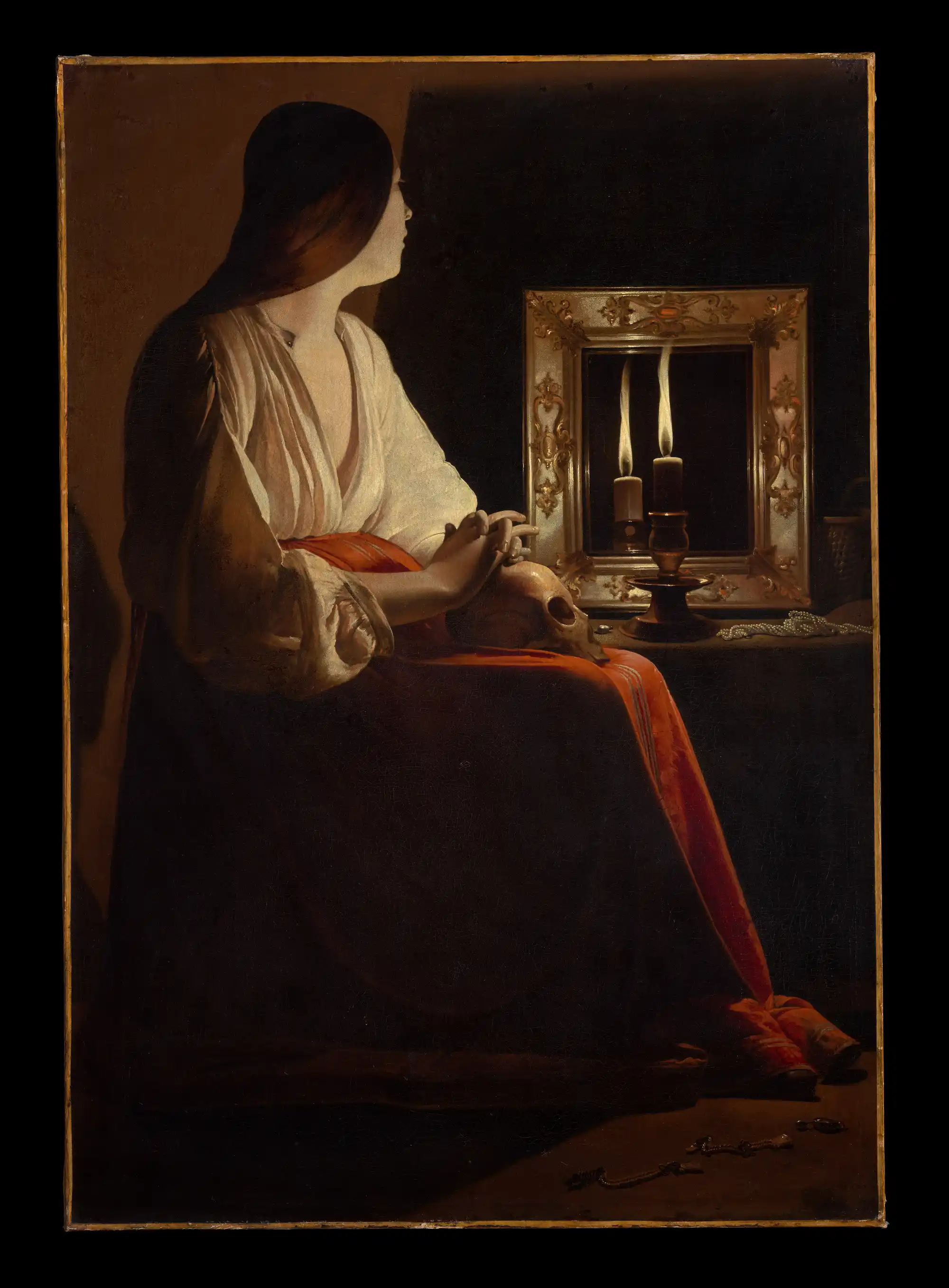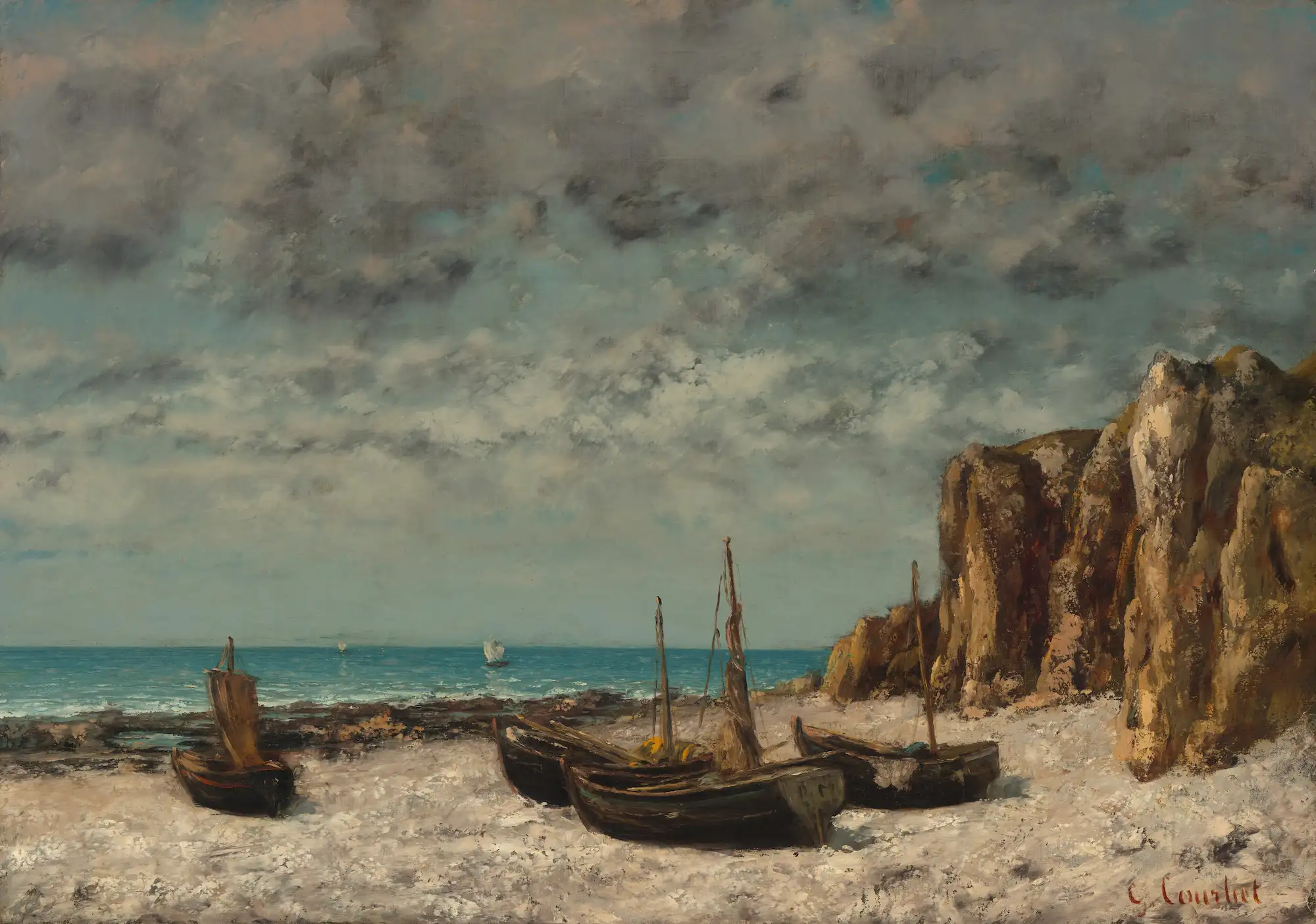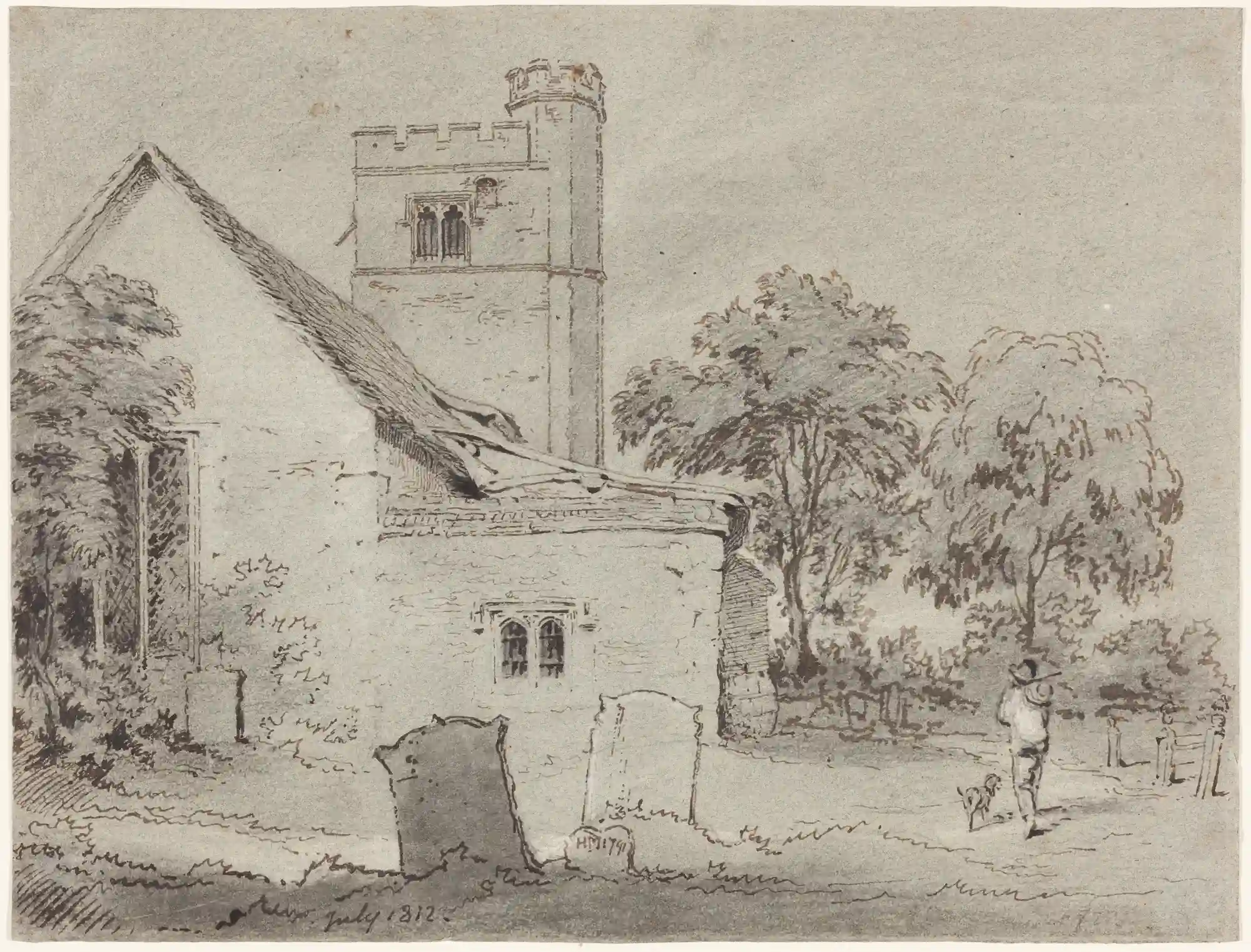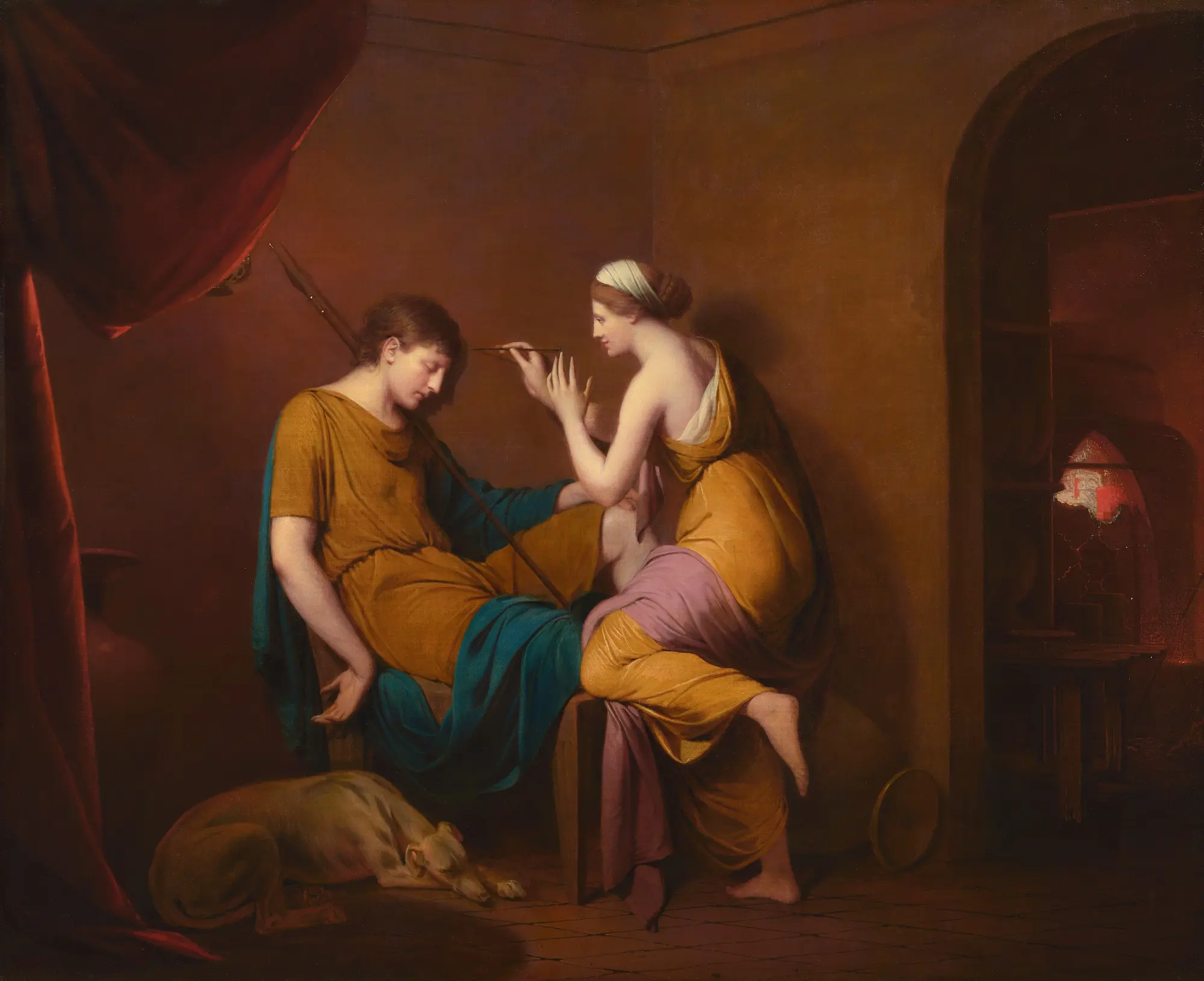
The Penitent Magdalen, by Georges de La Tour
OBJECTS IN MIRROR ARE CLOSER THAN THEY APPEAR
(1)
We waited two hours for our turn to pay our respects. Bill and I shifted in a pew at the back of the sanctuary while snapshots from happier days looped on large screens near the altar. Conversations buzzed all around us. We scanned the crowd for familiar faces and found only one: your eighty-six-year-old father, seated on a tall stool at the front. He leaned forward to gaze into the eyes of each person who shook his hand.
At last, the ushers invited us forward. We shuffled up the carpeted aisle to offer our condolences to your aunt and uncle, your sister and brother-in-law, your niece and nephew, and finally, your dad. He greeted us warmly and thanked us for being good friends to you over the years. Struck by your strong resemblance, I bit my lower lip and relied on Bill to do the talking.
I had to will my knees not to buckle when we found you at the end of the receiving line. I hadn’t anticipated an open casket. In life, your lanky six-foot-plus frame had always dwarfed mine. Now, I looked down into the polished wooden box and stared at the withered shell of your body. The absence of your breath took mine away.
Since we last saw you in person, eighteen months earlier, you’d aged at least a decade. I had to remind myself you were five months younger than me. Not even fifty. Woven through a spray of white roses, a sash read simply: “Uncle.” Someone had dressed you in a button-down shirt and charcoal gray suit instead of your signature plaid flannel and khakis. Faint freckles painted your ashen skin and a poorly trimmed, pepper-colored beard covered your sunken cheeks and neck. Paper-thin eyelids hid those baby blues that would never again sparkle. Hot tears streamed down my cheeks as I faced the horrible truth I could no longer deny: you were gone.
(2)
I knew we needed to attend your visitation, but I didn’t want to go. Fear tempted me to avoid reality, to pretend we’d simply fallen out of touch for a season. In the end, though, I knew I would regret my cowardice. We decided to make the trip.
That morning, I puttered around our bedroom, packing my overnight bag. We planned to stop at Bill’s parents’ house on the way, three hours into the four-and-a-half-hour drive to your hometown. We would wait to get dressed up until after our lunch with his mom and dad. Might as well be comfortable for as long as possible, we figured. Maybe that way we’d be less rumpled, a little more presentable, when we arrived at the church. I gently folded my black dress, placed it inside the bag, and zipped it closed.
Bill walked into the room to ask if I was ready to go. Before I could answer, he caught me staring at his faded concert T-shirt. “I bought this when we went with Todd to see U2 at Soldier Field,” he explained.
I thought back to that night. You guys were hard-core fans and had already been to a few of their shows, but it was my first. The set for the 360° Tour looked like an enormous spaceship had landed in the middle of the open-air stadium. Beneath claw-like metal legs, the circular stage formed a launch pad surrounded by rings of ecstatic earthlings. The wraparound jumbotron beamed close-ups of the band to our seats in the outer reaches of the galaxy. We belted out the lyrics, soaking in every note, while a pulsing beat ran through our bloodstreams. As the summer sun set and stars punctured an ebony sky, I remember thinking: this is what a rock concert should be. After the second encore, we descended the stairs to join the masses funneling toward the exits. The three of us linked hands so the pressing crowd couldn’t separate us.
Your height allowed you to see what we could not. Bill and I trusted you to guide us, since our view was blocked on all sides by the sweaty bodies of strangers. Like whiny children in the backseat of the family station wagon, we incessantly asked, “How much farther?”
You looked out over the heads of the sea of people in front of us. “I’d guess…two hours from here? Unless we jump the fence, that is.” You pointed to the ten-foot chain-link barrier separating the walkway from a wide-open lawn and joked, “We can make it, don’t you think?”
“Honey?” Bill said, nudging me back to the present. “We should get on the road.”
I sighed, slung the bag over my shoulder, carried it down the stairs and out to the garage. We loaded the minivan and buckled ourselves into our seats. When Bill plugged in his phone, music flowed through the speakers. The screen displayed the icon for the album Songs of Surrender, U2’s 2023 release of forty of their classic hits, re-recorded with a more acoustic sound. A lump formed in my throat.
“Is this…okay?” he asked.
“Yeah,” I said, swallowing hard. “It feels right.”
We rode in silence while Bono lamented the limits of our one life, the fleeting nature of time, and our call to love one another. Fresh grief colored this soundtrack of our young adulthood, causing it to resonate on a new level. I marveled at the band’s almost fifty years together. They met as teenagers and stuck together through the decades, supporting one another through life’s inevitable changes. Just like us.
(3)
Sunlight glared down on the summer landscape lining the interstate. While Bill drove, I gazed out the window at fields of ripe corn waving below giant spinning windmills. In the passenger side mirror, a weary middle-aged woman stared back at me. Etched in the glass below her dazed expression, I read: OBJECTS IN MIRROR ARE CLOSER THAN THEY APPEAR.
I remember hearing about how you first learned you were sick. While serving on a retreat as a music leader, you suddenly could no longer play songs you knew by heart. Your fingers faltered, struggling to find the frets. Your words slurred, then fell away. Alarmed, your friends convinced you to go to the emergency room. A battery of tests and a week’s worth of waiting revealed the worst-case scenario: two large tumors on the right side of your brain. Even then, you remained hopeful. When the first doctor pronounced your condition to be “urgent, non-emergent,” you adopted it as a catchphrase. In an online post soon after your diagnosis, you wore a T-shirt imprinted with those words along with a cheeky grin.
Bill and I followed your updates closely on social media. We tracked your successful surgery and radiation therapy. We celebrated every clean follow-up scan, hoping you’d beat the odds. You tended to share most frequently when the news was positive, so we were slow to understand when your health started to fail. From what we could make of your posts, you were doing well, until you weren’t. We grew concerned when we heard about your seizures, and soon, new tumors were discovered. Your body gave out within a matter of months.
Restless, I picked up my journal and a pen, compelled to make use of the long hours ahead on our journey. Over the past year, I had become intrigued by the concept of found poetry, the art of using pre-existing words to write something new. I played with fridge word magnets, arranged titles written on the spines of books, even crafted poems using only the words I chose not to black out on a random book page.
Using only the letters in the side mirror’s warning, I decided to play a new version of an old game, one I play every six months while reclining in the chair at the dentist’s office. While a chatty hygienist scrapes my teeth, I mentally rearrange the letters engraved on the arm of the light above me. “Pelton & Crane” becomes lane, pare, none, alert, clean. This word search settles my nerves until I am free to leave.
I started by printing the sentence at the top of a blank journal page. Obvious words jumped out at me first. Roses, eyes, sense, meant, real. In no time, I completed one narrow column and started another. Longer words gradually revealed themselves. Complete, incomplete, respect, appeasement, certainty. Five columns later, the whole page was full. Words accumulated like points in a video game, pinging me with hits of dopamine. Misery, instinct, apart, particle, mist. When the flow of ideas ebbed, I would put down my pen, only to pick it up with a start each time a new one occurred to me.
Eventually, my inner critic piped up to ask how many distinct letters the warning contained. I counted them using hash marks in the margin of the page. My pride deflated when I saw the total: sixteen. The whole English alphabet contains only twenty-six letters. I had allowed myself to use all but ten. The last line of words scrawled on the page reminded me of the sad purpose of our trip. Ache, sorry, empty, absent, tears.
To mourn your death, we were returning to the last place we had seen you alive. The previous January, Bill and I drove out with our kids to visit you over the holidays. We met for brunch at the Butterfly Café, a local spot a few blocks away from the church where you worked as a music and youth pastor. The five of us piled into the corner booth to feast on pancakes and catch up on one another’s lives.
You included our teenagers in the conversation, asking with sincere interest about their classes and activities. They shared stories of musical performances and cross country meets, then dug into their food, content to let us grown-ups talk. When Bill asked about your health, you told us you’d been feeling good. The doctor had recently cleared you to drive, now that the seizures, a side effect of radiation, had subsided. You described some lingering brain fog and occasional headaches but were quick to praise God and the doctors for your remarkable recovery. I sipped my tepid coffee and let my scrambled eggs get cold, listening closely for changes in your speech. Every so often, you paused for an awkward beat before recovering your train of thought.
Our meal stretched over a couple of hours. I lost count of the number of customers who walked by our table to say hi. You knew most of them but occasionally would notice someone across the room and hesitate. “Sorry, guys,” you’d say. “Give me just one sec.” Discreetly pulling out your phone, you scrolled through a parish photo directory. After confirming the name that matched the face, you confidently used it to greet the person, drawing a wide smile every time.
“You’re a local celebrity!” we teased, after yet another family stopped to chat.
“Occupational hazard, I guess,” you said. “Also, I’ve lived here a long time.”
After lunch, we followed you to the church. You gave us the grand tour of the building and told us all about your job. Evidence of silly pranks and inside jokes by your co-workers lined the walls of your office, much like they had your old dorm rooms. Each one prompted a story. Our kids got a kick out of the foam mat you kept there in case you had time for a nap during the workday. “Seventeen minutes,” you declared proudly, “that’s all the shut-eye I need to feel restored.” In college, you had a reputation for falling asleep at odd times and in odd places. You had even been known to doze standing up, leaning against a wall. Bill and I laughed at this proof that you hadn’t changed, but I couldn’t help but wonder if this level of fatigue was due to your cancer treatment. How much of your energy had it taken? How much more would it take?
When it was time for us to go, you escorted us to the parking lot. The crisp air woke me up and broke the spell of our easy banter. One by one, you wrapped us each in a big hug. My lips stretched into a tight smile, but my heart pounded, flooded with sudden anxiety. You seemed so healthy, so much like your old self, but we knew the cancer was aggressive. As we drove away, you stood there in your puffy vest and knit hat, smiling and waving, until we couldn’t see you anymore. My vision blurred as pent-up tears broke free. In my gut, I knew we had just said our last goodbye.
(4)
A couple of our mutual friends from college showed up just as Bill and I were about to leave your visitation. The long line that remained meant these guys were in for a wait, so we joined them to exchange updates about our lives and families.
As we talked, time folded in on itself, squeezing the layers of life together. Shared memories transported us back to our younger selves, before their hairlines receded and crow’s feet marked us all. I struggled to reconcile the sound of their familiar voices with our current setting. Caught up in the moment, I forgot – ever so briefly - the somber reason for our reunion, only to be sucker-punched by sadness when I remembered you were gone.
Our circle widened to include a few of your other friends, including a woman I had never met. I recognized her from photos on your social media page. You were never one to advertise your love life, but comments on those posts made me wonder if she had been more than a friend. Curious, I walked over to where she stood and introduced myself.
“Tessa, right?” I guessed, extending my hand. “I’ve seen you on Todd’s Facebook page. How did you two know each other?”
Her face relaxed into a smile as she grasped my hand and shook it. “We met on a retreat a few years ago,” she said, “and then got to be good friends when I started volunteering at the youth group he led.” Her kind brown eyes met mine. “He was a beautiful soul, and so much fun.”
“Todd was the best,” I agreed. “I don’t know if I’ve ever met anyone so genuine, so himself.” Out of the corner of my eye, a photo of you clowning around at a costume party appeared on the screen. I smiled, shaking my head. “He was one of a kind, wasn’t he?”
“Yes! I know what you mean…he was just so…good.” Her face clouded over, but her eyes kept shining. “He handled everything with such grace and humor: hoping for a miracle but humbly accepting that it might not come.” She let out a sigh. “I just wish we could have had more time together.”
I nodded. “I could tell from his posts you’ve been a huge help to his family through all of this. I know they must really appreciate all you’ve done for Todd, and for them.”
“I was glad to do it,” she said, “to help him out for a change. Did you know that when the doctor diagnosed him with glioblastoma, the first thing he said was: ‘But I need my brain to tutor the kids!’ He was always thinking about others, and he kept serving as long as he could.” She paused and took a deep breath. “Even though it hurt to watch him suffer, I felt like God was asking me to walk him home.” Her words hung in the air between us before finally resting, heavy, on my heart. Blinking back tears, she cleared her throat and continued, “It has been the greatest privilege of my life to do so. I feel incredibly lucky to have known him.”
At the top of the list of the many injustices of your interrupted life, before all the things you would never get to do, all the work you would not be able to finish, was that you had never found a partner with whom to share your life. While Tessa had not divulged how you two defined your relationship, the tenderness in her voice told me everything I wanted to know.
I put my hand on her shoulder. “Thank you…” I said, my voice breaking. We locked eyes and she reached out to hug me. As we stood there, holding onto one another and crying, I silently prayed that she would feel seen for all she had sacrificed, for all she had lost. I couldn’t bring you back, but I could be a witness to her pain. When it was finally time to let go, I whispered into her ear, “Thank you for loving our friend so well.”
(5)
A few weeks after your funeral, I opened my journal to the hastily scribbled list from our long drive to Illinois. I flashed back to the warning on the side mirror and thought about how easily time gets distorted. Despite knowing our days are numbered, that our human condition is “urgent, non-emergent,” I can’t seem to wrap my mind around the reality. Death always manages to surprise by arriving too soon.
Longing to say something true, I rearranged the words I’d found into an upcycled poem, an offering for you shaped from the broken pieces of my heart.
OBJECTS IN MIRROR ARE CLOSER THAN THEY APPEAR
a lone seam in this slim lane separates time-torn eternity
each eerie eclipse ejects
another story incomplete
onto harsh cement
in this realm so poorly lit
earth enacts its penalty
incites crash-born lament
here thin prayers stretch
tear into tatters
pelt empty air to sap clean
any certainty in matters
here shiny armor that clothes
the tense heart shatters
as absent breath becomes reality
a present ache remains
September 24, 2025
Further considerations

Lament of the Perfectionist
I am building a boat in the basement // and there are still so many details to work out.

The Grief Lexicon
I opened your bag today. The orange one Mrs. A gave you on your last birthday, the one with the gold buckle you said made you “feel like a senator’s wife.” I don’t know why I was reaching for it.

The Artist and a promise
Gold splashes desperate over burning sienna, // The artist is choosing tobacco over bread.